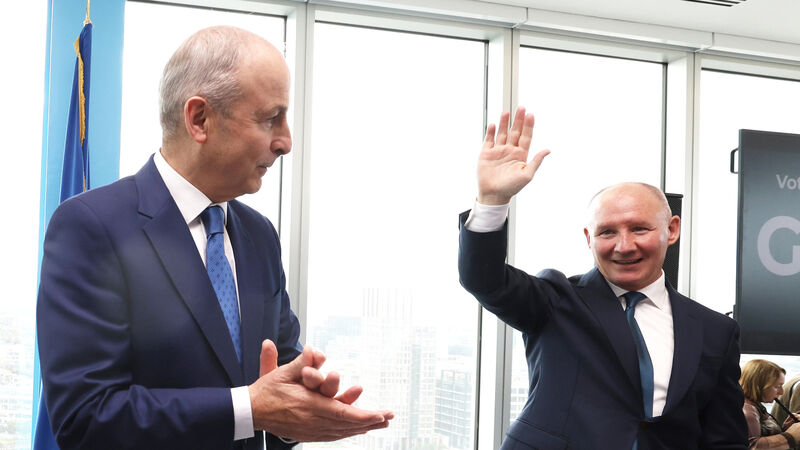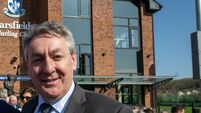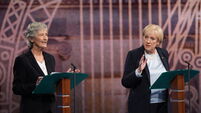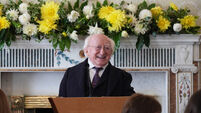Presidential election: Will Micheál Martin pay price for Jim Gavin’s debt?

Taoiseach Micheál Martin and Jim Gavin. Picture: Leah Farrell/©Rollingnnews.ie
Micheál Martin’s hands shook slightly, some attendees of Wednesday evening’s Fianna Fáil parliamentary party meeting said, and his voice threatened to break.
In an emotional address, the Taoiseach apologised for his party’s presidential election debacle and acknowledged the “hurt and shock” of party members, saying he was devastated.
Mr Martin had been obviously upset in the days after Jim Gavin’s bombshell withdrawal from the presidential election late on Sunday night, in the midst of a controversy over a dispute he had with a former tenant about an overpaid €3,300.
Fianna Fáil members are angry that without a presidential candidate they will be locked out of the Áras for at least another seven years.
The parliamentary party meeting — the ‘PP’, as its members call it — was billed as the fight of the Taoiseach’s life, with some members claiming there would be “blood in the air”.
In the end, it turned out to be nothing of the sort.
Mr Martin gave what some of his harshest critics acknowledged was a sincere and contrite address, followed by an exhaustive account of the due diligence the party had undertaken prior to selecting Mr Gavin.
The Taoiseach said he was open to any suggestions on changing the presidential selection process, adding that he “always had the best interest of the party at heart”.
Speaker after speaker outlined their disappointment, with most stressing the duty of care the party had to Mr Gavin and his family.
In truth, the heat had probably gone out of the PP by lunchtime on Wednesday, when justice minister Jim O’Callaghan, who is still seen by some as a future leader, announced that he was happy that Mr Martin was “doing a very good job as leader of Fianna Fáil and, indeed, as Taoiseach”.
One of the Cork rebels had actually predicted on Monday that something like that would happen, telling this reporter bitterly:
“Big Jim is after marching us up to the top of the hill more than once, and he’ll probably march us back down again this week, too.”
It was striking that in the week of one of the biggest set-pieces of the parliamentary calendar, the main question seemed to be ‘Budget? What budget?’
That wasn’t the main question in The Groves in Blackpool on Tuesday, as the lunchtime crew glared at the budget on the big screen, while they gave out about a measly tenner on the pension, the cost of living, and the (untouched) price of the pint.
There, the main question was: ‘C’mere, is Micheál f**cked or what?’
As the week unfolded, it turned out he probably wasn’t, or at least not yet.
Still, there was a telling moment in the PP when former ceann comhairle Seán Ó Fearghaíl suggested that there needed to be a major rethink in the party come January 2027, when Ireland completes its presidency of the European Union.
The office of Taoiseach is due to rotate to Fine Gael in November 2027, and Mr Martin has repeatedly said he intends to lead Fianna Fáil in to the next election, which is expected to occur at the end of 2029.
If he were to so much as hint that he was not planning on leading the party in to the next election it would immediately be game over for him, but, even so, Mr Martin does appear genuine in his desire to stay on until at least then. Mr Ó Fearghaíl’s intervention now challenges that.
If the immediate threat to Mr Martin’s position appears to have passed, Jim Gavin’s name remaining on the ballot means he won’t be able to draw a line under this catastrophe just yet.
Meanwhile, back at the race, Paddy Power has already paid out on a ‘President Connolly’, so perhaps it’s all over. Perhaps not, though. They paid out on Cork, too.
Mr Martin has often said that most people — those who are not politicians, journalists, or insatiable nerds — only tend to really tune in during the final four or five days of any election campaign.
If the Taoiseach is right — even if his own heart is gone out of it now — Heather Humphreys may still have it all to play for.
On Tuesday, Mr Martin said he would not be asking Fianna Fáil supporters to lend their votes to the Fine Gael candidate, saying:
“Look, people will make their own individual decisions … I don’t believe in dictating to people, or telling them how to vote.
“That never works.”
Maybe he was still smarting at being called “a dictator” by Galway county councillor Michael Regan, or maybe the party faithful will get the message the same way Fianna Fáil councillors didn’t need to be specifically told not to nominate anyone else to run for the presidency.
One local Fianna Fáiler — a Micheál man — didn’t need to be told, saying this week that he would have to rewrite his own political DNA and vote for Heather Humphreys, for once allowing ideology to outweigh history.
There is an adage among seasoned political reporters that ‘presidential elections always deliver’, but few have ever delivered so magnificently as this one.
Still, for connoisseurs of the genre, it might be worth recalling the 2011 election, which was truly a golden age of presidential spectaculars.
Senator David Norris’s campaign came a-cropper when it emerged that he had, years earlier, written a letter — on Oireachtas-headed paper — to an Israeli court pleading for leniency for his former partner, Ezra Nawi, who had been convicted of statutory rape of a 15-year-old Palestinian boy.
Mr Norris withdrew from the campaign in early August, before returning in late September.
Following encouragement from Labour candidate Michael D Higgins, four councils nominated Mr Norris, and he went on to come fifth of seven candidates.
During the TV3 presidential debate, host Vincent Browne grilled Martin McGuinness about his membership of the IRA, producing from under his desk, one after another, eight books, which each contended that the Sinn Féin candidate had been a leading member long after he had claimed he had left.
It was described at the time as an ambush worthy of General Tom Barry.
And Dana Rosemary Scallon declared — we must assume erroneously — that a burst tyre was an assassination attempt.
Memorable, too, was the reaction of RTÉ’s David McCullagh, who responded to this possibly Kennedyesque near-miss via the medium of both eyebrows, while employing the full name and title of the ‘saviour’.
During the 1997 United Kingdom general election campaign, the Labour Party, enjoying a sizeable lead in the polls and terrified of doing anything to frighten the horses, began to shed potentially controversial policy commitments.
As leader Tony Blair strove to find a balance between keeping his own party onside and courting the wider electorate, Liberal Democrats peer Roy Jenkins likened him to “a man carrying a delicate Ming vase across a polished museum floor: One slip and it smashes”.
This week, while Fianna Fáil was attempting to deal with what Malcolm Tucker might have termed an ‘omnishambles’, the two remaining candidates did their best with their own Ming vases, neither one entirely successfully.
Responding to a question on the issuing of a gender certificate for a trans prisoner, Heather Humphreys said: “A woman is a female adult and a man is a male adult.
“That’s my belief.
“But we know the world is not black and white, and there are complexities there. Obviously, it’s a difficult situation.”
This response was celebrated by some as common sense and condemned by others as a betrayal of trans people.
Catherine Connolly took 24 hours to eventually answer that, no, she would not hire a convicted rapist who had served his time.
Ms Humphreys had to take down a video that accidentally used a clip of the Bundestag instead of Belfast City Hall.
Ms Connolly had to take down a video that used a clip of her political enemy and — Paddy Power assumes — her predecessor in the Áras, Michael D Higgins, which she had apparently used without his permission.
Thirteen more days of this.









 App?
App?


